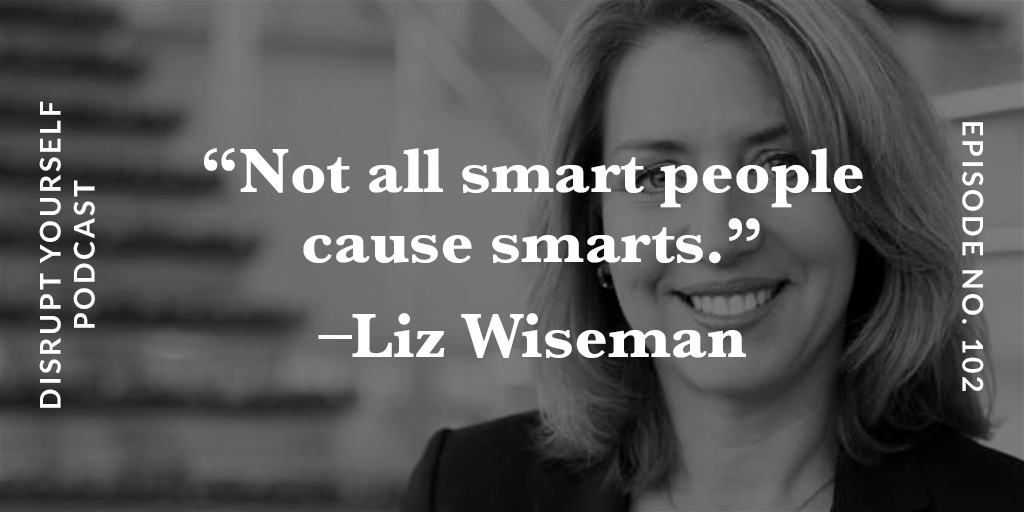It’s almost graduation season in America, with college and university students preparing to finally, finally, step out into the world to obtain that much anticipated (and slightly ominous) “first job.” The one that will validate your choice of degree; the one that will set your career trajectory; or, at the very least, the one that will pay the bills! But if Liz Wiseman could shout one thing from the rooftops to graduates, it would be this:
Don’t take a job; pick a boss.
“[T]hat first person or two that you go to work for who you get assigned to right out of college, or as you’re new to the workforce—that person is going to have a huge impact on your life and your career.”
Liz Wiseman knows a thing or two about bosses. She is the author of the best-selling book Multipliers, which explores the impact that leaders have on their teams, whether positive (multipliers) or negative (diminishers). In researching for the book, Liz and her team analyzed data from over 200 leaders and noticed a trend between the groups that seemed to maximize the potential of each individual versus those groups that experienced drains in intelligence, energy, and capability (despite having highly intelligent members). What her research found was that some leaders inspire employees to stretch themselves and do more, while others, despite high intelligence, “diminish” (sometimes accidentally) that ability of their team members.
As Liz likes to put it, “Not all smart people cause smarts.”

If recent graduates find the right kind of boss—a multiplier—Liz’s research shows that their capability will rapidly expand, and not only will that boss get 100% of that new employee’s capability, but over 100% of their capability. It’s a growth dividend that may sound like hyperbole but has been demonstrated time and time again. Diminishers, on the other hand, have employees operating at only 48% of their capability. In other words, employees that work for a diminisher are showcasing only half of what they can really do! Who wants that?
Even more shocking is the revelation that while obvious diminishers are tyrannical bosses, there is a sub-category of “accidental diminishers” who are nice, kind, well-intentioned people that derail their teams through their own omnicompetence and desire to rescue or otherwise “help” their team. Sadly, these leaders have just as negative an impact as tyrants and micromanagers.
Our conversation today explores how leaders can avoid the pitfalls that lead to becoming an “accidental diminisher,” as well as how to start on the road to recovery. We also get a fascinating look into Liz’s early life, including how she won a lawsuit at the age of only 17 years old.
You listen to the episode on iTunes. If you have suggestions for improvement I am ready for those as well!
Takeaways from this episode:
- While she didn’t relish the opportunity to defend herself in court at age 17, Liz admits that going through that experience taught her what she was capable of. As leaders we need to remember to step back and allow our team members a chance to learn and get things right.
- Liz didn’t dream of becoming a writer; that’s simply a byproduct of her need to create. As long as she is learning and creating a new learning curve she is happy in her work. Once that tapers off she recognizes that it’s time to do something else.
- When someone approaches a leader for advice, what they are really looking for is validation, reinforcement, support, and sympathy. Remind yourself that most likely they already know what to do, and your job is to get them to articulate it. Resist the temptation to rescue them!
- If you have a diminisher in your life, become a multiplier to them! Sometimes the best way out of a diminishing situation is to “multiply up” using their native genius. Invite them to meetings, be clear in what you need them to do in order for you to succeed, and help them feel part of the process. Invite them in, even when you want to run far away.
- Have a sense of humor. There is a negative correlation between diminishers and leaders who know how to laugh at themselves.
- Are you an accidental diminisher? It’s worth taking a few minutes to complete the quiz, then going one step further and having someone assign you an exercise for your particular accidental diminisher type.
Links Mentioned in this Episode:
- Liz Wiseman – Website | Twitter | LinkedIn | Facebook
- Multipliers, Revised and Updated: How the Best Leaders Make Everyone Smarter by Liz Wiseman
- The Wiseman Group
- Rookie Smarts: Why Learning Beats Knowing in the New Game of Work by Liz Wiseman
- Multipliers website
- Rookie Smarts website
- Build an A-Team: Play to Their Strengths and Lead Them Up the Learning Curve by Whitney Johnson
- Download a free chapter from Build an A-Team

